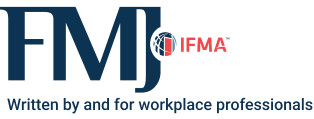On Standards
How FM standards pave the way for sustainable future
Although the theme of this FMJ issue is focused on sustainability, meaning “green” initiatives, this article will take a slightly different approach to the term sustainability.
We want to consider the impact FM standards have in sustaining an organization.
First, let’s level-set our understanding with some terminology that is key to understanding the role of standards in building a sustainable future for the FM industry:
Continuity:
-
the unbroken and consistent existence or operation of something over a period of time.
-
a state of stability and the absence of disruption.
-
a connection or line of development with no sharp breaks.
Facility management
Organizational function which integrates people, place and process within the built environment with the purpose of improving the quality of life of people and the productivity of the core business.
Resilience
Adaptive capacity of an organization in a complex and changing environment.
Standard
A document that provides requirements, specifications, guidelines or characteristics that can be used consistently to ensure that materials, products, processes and services are fit for their purpose.
To sustain:
-
cause to continue or be prolonged for an extended period or without interruption.
-
strengthen or support physically or mentally.
-
uphold, affirm, or confirm the justice or validity of.
Sustainability:
-
the ability to be maintained at a certain rate or level.
-
meeting the needs of the present without compromising the ability of future generations to meet their needs.
Facility managers are responsible for developing policies, processes and procedure to support the productivity of the core business of the demand organization regardless of the industry sector. It is no secret that FM requires a broad spectrum of expertise to be successful. Common areas of expertise include asset management, business acumen, risk management, energy and environmental management and more.
However, in an ever increasingly global world, the practices and understanding of FM are advancing at disparate rates within different markets. Added to that, more than half of today’s FM practitioners are expected to retire over the next 5-15 years. A 2017 joint industry report from IFMA and RICS states, “A shortage of skilled Facility Management talent is the most significant challenge identified by both the survey respondents and the executives who were interviewed directly. Facility Management is not attracting enough new talent to replace its retiring professionals.” This impending exodus of experienced FM practitioners will also result in the loss of knowledge of proven practices in the profession.
The standards being developed by the International Organization for Standardization’s technical committee for facility management (ISO/TC 267, Facility management) provide a common foundation for the FM discipline to sustain a uniform definition and scope of FM service delivery across international boundaries, global cultures and markets and a multigenerational workforce. With an established baseline for the FM discipline and FM practices, “a state of stability” from which service delivery and processes can be assessed and measured can be realized.
To date, ISO/TC 267 has three published standards, including ISO 41001, Facility management — Management systems — Requirements with guidance for use. This achievement is significant as these standards will represent how the FM profession and practices will be presented, communicated and understood in a consistent manner.
The work of ISO/TC 267 is summarized below:
Published
-
ISO 41011:2017 Facility management — Vocabulary brings a common understanding to FM terminology.
-
ISO 41012:2017 Facility management — Guidance on strategic sourcing and the development of agreements is aimed at ensuring that the important aspects of establishing long-term and sustainable working relationships between businesses partners are robust and fully considered at the outset.
-
ISO/TR 41013:2017 Facility management — Scope, key concepts and benefits provides an introduction and awareness of some of the many benefits and influences that a structured, FM approach will bring to the demand organization. At the same time, it provides an insight for those individuals who may be considering a career in FM.
-
ISO 41001:2018 Facility management — Management systems — Requirements with guidance for use enables organizations to organizations will be able to certify their FM systems against an internationally recognized standard much like ISO 9001. ISO 41001 encompasses the management of the activities and how they should be structured and enabled to achieve optimum efficiency, effectiveness and value.
In progress
-
FM Task Group (FMTTG) has a mandate to develop a recommendation and road map to understand technology solutions to modern FM challenges by exploring the issue of FM and technology, defining the many aspects of technology in relation to FM, and developing a recommendation for a way forward to navigate this domain.
-
ISO/AWI 41014, Facility management — Development of facility management strategy will be a valuable tool for identifying those areas of alignment and developing policies and processes to incorporate them into the daily routines of the workplace environment. The standard will outline the ways in which facility managers can significantly influence the main decision makers of their demand organizations and can establish communication with them regarding the role of FM in the long term.
-
ISO/AWI 41015, Facility management — Influencing behaviors for improved facility outcomes and user experience will pave the way for aligning organizational culture and occupant stakeholder/behavior with FM practices to support the corporate mission, achieve better facility outcomes/outputs and demonstrate the impact of efficient operations to ensure they meet desired operational performance requirements and outcomes.
Learn more about the work of ISO/TC 267, Facility Management at https://committee.iso.org/ home/tc267
These standards provide operational guidance and tools to streamline processes for both evolving nations as well as new FM professionals. They will ensure continuity in service delivery across geographic borders and age groups by capturing the knowledge from proven practices through a consensus-driven process and turning that knowledge into action. They will enable resilience within the demand organization by providing a framework within which organizations can address the ever-changing demands of the workplace, be it from evolving expectations from stakeholders or technological advances.
Sustainability, whether it be a “green” initiative or a culture of continuity and resilience, is an organization-wide strategy and program that is directed by either top down or bottom-up initiatives — a model facility managers are accustomed to managing. FM standards support facility managers by providing a framework to document business policies, procedures, and practices in a closed loop system for continuous monitoring, measuring and improvement. The function of FM is inherently a mission of sustainability as the FM perspective continually evaluates today’s tradeoffs for the longer-term impacts of tomorrow. These future impacts include social, economic, and financial considerations, as well as internal effects to the business. As an evolving profession and industry, FM will require exploration, pioneering and some risk-taking. FM standards provide clarity and framework to sustain the industry as through its evolution.

Laverne Deckert is an Independent consultant, working with organizations to creatively respond to their challenges. She has led research, educational programs, standards, and community development initiatives in the corporate real estate and FM industry. Her primary goal is to bring value to every interaction. Her colleagues value her curiosity and creativity, ability to organize complex information, to facilitate teams in meaningful collaboration, and her focus on strategic goals. Deckert currently as Administrator for the U.S. Technical Advisory Group Administer on behalf of the American National Standards Institute (ANSI) for ISO/TC 267 and as the convenor for ISO/TC 267/AG 1 – Roadmap Advisory Group.

Casey Martin has more than 20 years of building industry experience and is currently engaged in the asset management strategies practice at Jacobs Engineering. In this role, she consults with private and U.S. federal institutions, providing full life cycle perspectives throughout project development stages. Her approach considers important long-term views such as total cost of ownership, reliability-centered maintenance practices, operation strategies, and processes and policies to align asset management with business and mission objectives.
References
ISO 41011:2017 Facility management — Vocabulary
ISO Guide 73: Risk Management — Vocabulary
ISO 41011:2017 Facility management — Vocabulary
RICS, 2017. Raising the Bar Executive Summary. March 2017. rics.org/Documents/Raising_the_Bar_3_ Exec_Summary_130317_IC.PDF
Read more on Standards and Sustainability
Explore All FMJ Topics





